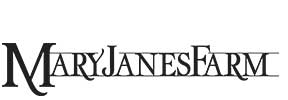In her first book, author preaches a slowed-down life Lewiston Morning Tribune PALOUSE RIDGE, IDAHO -- For families stuck in the rut of a two-job, kids-in-day-care, too-exhausted-to-do-anything-other-than-sink-into-the-couch-at-night kind of life, MaryJane Butters offers this advice: Try turning off the television and see what happens. It's not just that television robs families of time they could be interacting with each other, Butters says. It's also the messages TV relays about what people need to fill their lives, the latest fashions, new appliances and fast food. "It's a corporate thing,'' Butters says. "They want our labor. They want us to work and give them our lives.'' Butters hopes her first book, "MaryJane's Ideabook, Cookbook and Lifebook" will give women a road map to replace some of their daily chaos with something more fulfilling. The book combines anecdotes about Butters' life with recipes and instructions for embroidery, sewing and other projects. As Americans realize what they lose by abandoning these arts, they're returning to them, Butters says. "Which is why I'm in the limelight because my parents gave me these skills.'' Follow the cooking strategies in the book, and Butters says families will spend less on groceries and eat healthier food. Make time for a weekly knitting group, and Butters says, women will have more to show for it than a sweater. They'll get feedback about how to deal with their baby's diaper rash or their teen's back talk. What the book is not, Butters says, is a set of instructions for how to have a perfect home. Butters is hoping to push people away from widely held conventions such as all the dishes on the table have to match or that Christmas presents come from a store. "I've tried to doll up frugal and make do and can do,'' Butters says. Radical as some of this might sound, Butters points out that she's lived much of it. In an introduction to recipes for desserts called chill-overs, Butters writes about her previous marriage. When she and her then husband were spending a winter in Wyoming, she put everything from the refrigerator into a cooler one day and set them out on the porch as a way to prevent the food from spoiling without using electricity. "When my husband came home, he was less than impressed: and in fact, our disagreement led me to announce that, furthermore, if we were to have children, I wanted to raise them without a TV,'' Butters writes. "That notion, among others, certainly didn't help relieve the cold that was seeping in between us.'' Eventually the two divorced and Butters made good on her promises. She describes herself in the book at one point as "a single mom living the homestead life, without indoor plumbing, without money.'' For more than a decade, the outcome of the investment of time and money Butters and her investors made in her farm has been anything but certain. It's only been this year with the release of the book, increased sales of her magazine and higher traffic at her Internet chatroom that Butters says her organic foods are actually making a solid profit. What made her struggles preferable to alternatives like getting a traditional job was that she was living in the country with her children. They were almost always outdoors, sledding in the winter, playing in the creek in the summer, building tree forts, watching sunsets. When she got discouraged, her therapy was physical labor like chopping wood or washing clothes by hand, experiences she says that can't be replicated in lives filled with cell phones and two-hour commutes. "It's robbed us of something we can't describe or quantify.'' ------ Williams may be contacted at ewilliam@lmtribune.com. |


